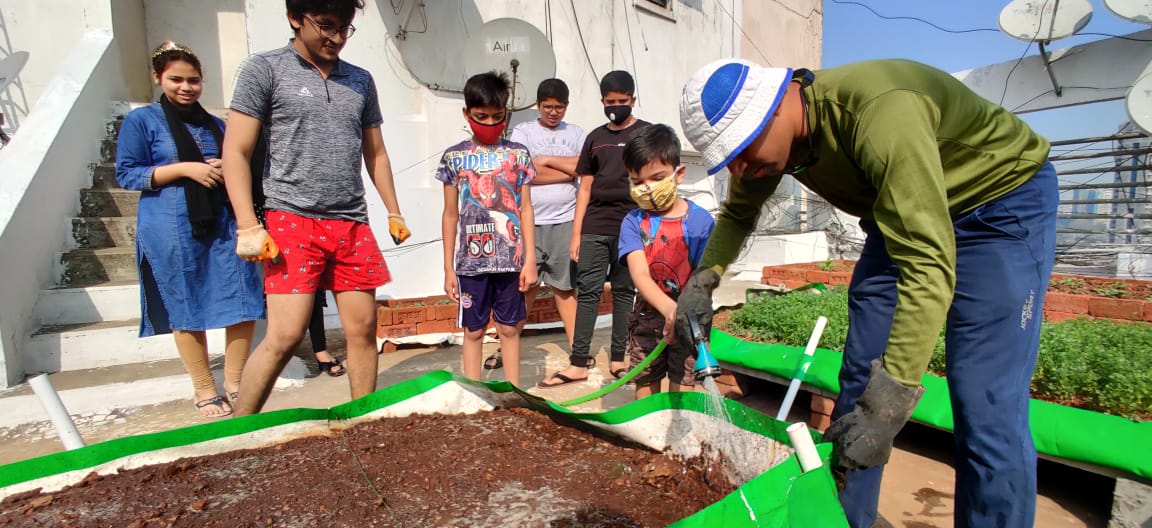A society in Mumbai’s Wadala area has not had a visit from the BMC (Brihanmumbai Municipal Corporation) waste collection truck for over two years. Instead, Emgee Greens society has been turning its garbage into fertilizer.
In Mumbai, a total of 6,500 to 6,800 metric tonnes of garbage was generated in 2019-2020, as per an Environment Status Report (ESR) released by the BMC. Almost 73 per cent of this waste was food-based.
Recognising this burgeoning problem, the society is striving to be a ‘zero-waste’ society.
Growing Organic Vegetables
Emgee Greens society with 131 families generates nearly 60 kg of wet waste every day.

The residents have been collecting the society’s garbage in the building’s backyard and turning it into fertilizer by following the aerobic composting method. This was started in an attempt to avoid the society’s garbage being added to the dump yards in the city.
“The municipality has not been collecting garbage from this society for two years now. This is why It is called the ‘zero garbage society’,” confirmed the local corporator Sufiyan Vanu.
However, it wasn’t long before the residents fell into a whole new conundrum. “There are 131 families living in the society. Though, we were happy making an effort to reduce our garbage, however, there was no one to buy the fertilizer we were generating,” says Ashwin Fernandes, the secretary of the society.
From the daily waste generated, only 1 tonne of fertilizer has been generated so far.
However, certain residents of the society would make regular use of the fertilizer. Suhail Merchant used to grow flowers on his balcony while another resident, Sunil Deshpande, used to grow veggies like spinach, fenugreek and coriander on his balcony.
“We got to know that the other was also growing vegetation on balconies. That is how we thought of organic farming on the terrace. The process of turning garbage into fertilizer and then using it to grow organic vegetables on the terrace made sense, so we sought permission from the society’s secretary, Ashwin, and started this project about five months ago,” says Suhail, who is a business consultant.
Their reason for going the organic route is to avoid the excessive use of pesticides in growing crops.
Today, the Emgee Greens residents harvest 90 kilos of veggies in a month, including spinach, fenugreek, aubergines, chillies, bitter gourd, cauliflower, coriander and tomatoes on their terrace. Sunil, Suhail and another resident, Atharv Deshpande, spend a lot of time on the terrace farm, compared to the other residents. “Apart from us, other residents also contribute by helping us look after the terrace farming needs. We also conduct farming sessions every Sunday where all the residents and their children engage in organic farming workshops,” adds Atharv, who is planning on doing his MBA soon.
Farm beds from discarded cupboards
Not only are the residents using garbage to grow organic vegetables but are also recycling other items, which cannot be turned into fertilizer, to make farming beds. They grow vegetables in old water bottles, buckets, washbasins, cupboards and beds. “We are trying hard to recycle every element so as to reduce our expenses on terrace farming as well. We are recycling, reusing and reducing,” adds Suhail.
The society spends Rs 11,000 a month, including the cost for a full-time gardener, on its organic terrace farms.
He further explains that it takes “eight days to make a new bed for any plant”. “We put soil on the bed and water it for four days. Then we add bionil—which is also organic and used to enhance the fertility of the soil—water it for two days, so that it becomes nutritious for any plant, and then add the fertilizer. We then add more soil. This process takes eight days,” says Suhail.
The terrace farming also helps residents of the society consume organic food. The availability of an organic farm in their society has helped them immensely during the lockdown. “Of course we are not having organic food all the time. But, even if we are having it twice a week, it is enough,” says Atharv, adding that the farm is not able to meet all the vegetable needs of the society.
But this is only a pilot project for the residents who urge the rest of Mumbai’s societies to follow suit. The society’s Instagram page, GreensPerSqFt is teaching others about the process of taking up terrace gardening and organic farming.
“The pandemic has increased the dependency on farms in the metropolitan cities. This idea of using garbage to make fertilizer and using that to grow organic veggies will make societies more self-sufficient in the future. Imagine a time when all terraces begin organic farming… wouldn’t that lead to a healthier and happier life?” Atharv signs off.
(Edited by Yoshita Rao)
If you found our stories insightful, informative, or even just enjoyable, we invite you to consider making a voluntary payment to support the work we do at The Better India. Your contribution helps us continue producing quality content that educates, inspires, and drives positive change.
Choose one of the payment options below for your contribution-
By paying for the stories you value, you directly contribute to sustaining our efforts focused on making a difference in the world. Together, let's ensure that impactful stories continue to be told and shared, enriching lives and communities alike.
Thank you for your support. Here are some frequently asked questions you might find helpful to know why you are contributing?

